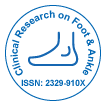开放获取期刊获得更多读者和引用
700 种期刊 和 15,000,000 名读者 每份期刊 获得 25,000 多名读者
索引于
- 谷歌学术
- 夏尔巴·罗密欧
- 打开 J 门
- 学术钥匙
- 参考搜索
- 哈姆达大学
- 亚利桑那州EBSCO
- OCLC-世界猫
- 普布隆斯
- 日内瓦医学教育与研究基金会
- 欧洲酒吧
- ICMJE
有用的链接
开放获取期刊
分享此页面
抽象的
The Effects of off-the-Shelf Foot Orthoses on the Quality of Life of Patients Diagnosed with Early Rheumatoid Arthritis
Derek Santos
Background: Rheumatoid Arthritis (RA) is a chronic and progressive disease that is reported to affect the foot in about 90% of cases. Off-the-shelf foot orthoses are widely used to treat patients with early RA because they are cost-effective but more evidence on their clinical effectiveness is required. This study aims to strengthen the current evidence for off-the-shelf foot orthoses.
Methods: Thirty-five patients participated in the study (mean age (SD) was 52.4 (13.3) years). None of the participants had received foot orthoses or had contra-indications to their use. Participants were excluded if they suffered from concomitant musculoskeletal disease, endocrine disorders, and neurological disease. For the within subject controlled study design, data was collected at baseline, three months and six months. A biomechanical assessment was carried out at baseline and the chair-side customized off-the-shelf foot orthoses supplied. Every patient completed the Leeds Foot Impact Scale (LFIS) questionnaire at each visit.
Results: For LFISif subscale there was statistical significance between baseline and three months (p=0.000) and baseline and six months (p=0.000). Similar results were also found for LFISap between baseline and three months (p=0.001) and baseline and six months (p=0.000).
Conclusion: This study suggests that cost-effective off-the-shelf foot orthoses are effective in the management of early RA patients. Patients may expect to see an improvement in QOL by three months with a further improvement by 6 months. This positive effect on QOL is also clinically significant provided patients wear their orthoses for at least six months.

 English
English  Spanish
Spanish  Russian
Russian  German
German  French
French  Japanese
Japanese  Portuguese
Portuguese  Hindi
Hindi